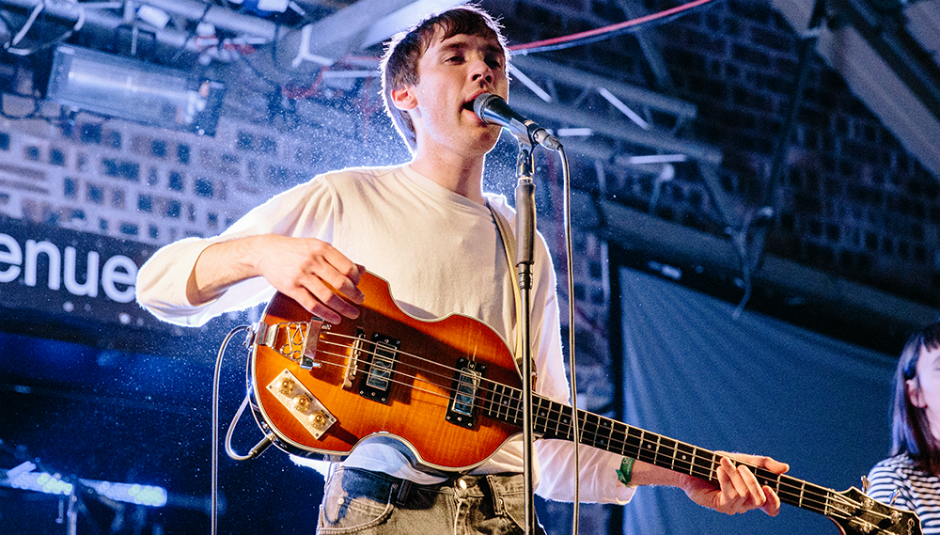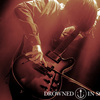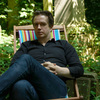2013 didn’t start well for Meilyr Jones. Both his band, Race Horses, and his personal relationship came apart. Seeking a break, Jones headed off to Rome, with no particular plan or ambition other than a vague notion of exploring Italian art and culture. There was no design or desire to return to songwriting, let alone to make another album. Yet Rome is where the story of Jones’ debut solo album 2013 begins.
As the title of one of the album tracks suggests, the eternal city was Meilyr's “return to life”. The resulting album is defiantly anachronistic and hugely ambitious in its musical scope. A record brimming with cultural references and musical diversions – from Byron to DH Lawrence, from medieval music to motown – 2013 manages the seemingly impossible task of being both proudly high brow and flamboyantly pop. Unlike some of Jones’ early material, none of the songs on 2013 are in his native Welsh, but there’s something wonderfully odd and gently fierce, as well something of the Super Furry Animals’ and Zorky’s heritage, present in his music.
The young Welshman’s musicality is unquestionable (he did attend the Royal College of Music after all), but it's the startling theatrically and intensity of his live shows that put him in an entirely different league. Variously compared to a whole galaxy of stars and cult legends from Bowie to Jarvis Cocker and Jonathan Richman, his music and shows incorporate elements of all those artists’ work, but the end result is also something altogether different. His use of space, improvisation, audacious sincerity and clear bond with his band make Jones' shows addictively compelling. See him once, and pretty soon you’ll be working out how to get to his next gig. Off stage, Jones instantly strikes you as someone strangely, almost unnervingly honest and caring, a character with a real openness toward other people and the world. His joyful enthusiasm and childlike wonder are mixed with the most poignant kind of modesty that immediately appeals to those who meet him. Quietly confident in his artistic vision, he is someone who’s clearly very much in control of his work, and his gentle Welsh lilt also hides a very spirited character with a wicked, playful sense of humour.
Before his FOCUS Wales gig, DiS met Jones in a little cafe in the centre of Wrexham to chat about Wales, his passion for performing live, his new arts projects, and why he thinks music "will become more exciting and less safe.” 2013 may have been not Meilyr’s best year, but 2016 is turning out to be a winner.
DiS: Since we’re in Wales it seems appropriate to dig a little into your past. Before playing as a solo artist you were part of Race Horses, who’re still fondly remembered by many. Why did the band split?
Meilyr Jones: (Hesitantly) I think I just felt ready to change. I loved the band and we’d been doing it for years, but the band changed members after we recorded Furniture. We had a great live setup but eventually I just felt it was time to do something different. I felt I was growing in a different way. It was a combination of things, and it was difficult. And being in a band is hard when it comes to making decisions.
With Race Horses you were signed to Stolen Recordings, but now you’re with Moshi Moshi. How did this relationship come about?
I knew Stephen (Bass) from the label. I kept seeing him at contemporary classical concerts where my friends played. Aisha (Orazbayeva) was on his label – a different label called Prah Recordings – and a lot of my friends ended up playing on her album, so I'd go to concerts and I’d see him sometimes. I guess he was interested in what I was doing and I spoke to him a bit. And then he asked me to send stuff, but I didn’t really want to send anything until I was happy. Then I met Pete, who is my manager and also works for Moshi Moshi Management. He asked me to send stuff to him, and I’d recorded “Refugees" but I wasn’t that confident. I didn’t know what I wanted to do, or if I wanted to work with a label at all.
Were you thinking of releasing something yourself?
Or not releasing, or not doing a record, but doing a film. I wasn’t sure 'cos I had had bad experiences with labels and management. I sent Pete the song “Refugees”, and then Pete got back and wanted to do something more. He was really helpful and suggested I should send it to Stephen, who liked it so we started talking. I started recording more and sent them “How To Recognise A Work Of Art” and then we started working together. So far it’s been really good and they’ve been great.
Is there a second album on the horizon?
It’s really strange 'cos I just feel really happy playing these songs (from 2013) and the live versions of them just feel so imaginative! For me, using my imagination every day and bringing songs from the album to life is occupying a lot of my creative force at the moment. I’m intentionally not thinking about the second album.
Are there any new songs?
There are songs I’ve written but in a way I keep them private, even from myself, until I know exactly what I want to do. Right now I don’t know. I know some people write endlessly. I guess I write quite a lot but I don’t just want to go through the motions, or do things 'cos they are expected of me. While we’re doing a lot of the live stuff it’s a different part of the brain. It’s different from the kind of quietness I need for writing. I need to quieten down, go somewhere else. To focus on writing I need to be in completely different zone.
Talking about live performances, the album itself involves so many different types of recordings, from a full orchestra to field recordings. In a live setting there are only five of you. How did you translate the album into a live show?
I was really instinctive with it and very fortunate that the musicians I’m working with are multi-instrumentalists. We try vastly different versions of songs. "Passionate Friend" is interesting 'cos it was recorded with a full orchestra – strings, saxophone, muted piano... I thought that bass line (starts humming) would make a cool post-punk thing. Re-imagining or just keeping the essence of the song but really changing the arrangement felt really liberating. It feels like a band but it’s also different. I think it’s just getting really instinctive, willing to change things at the last minute. Feeling something and then going: “Ah, actually, let’s try this differently through a different arrangement”. It’s really crucial. I think that’s the thing that I enjoy rather than trying to perfect the same gig.
Was it a difficult process?
It was hard work but it happened quite easily 'cos I was really clear about what I wanted. I guess I’m always clear when I know something is good or not. And I just work until it’s right.
How are things going with the tour at the moment?
It’s absolutely amazing! I’m so happy we’re doing it and meeting people. There’s a difference this time 'cos some people know the album now; that’s been a bit of a shock. It feels really exciting and I feel really ready to explore, but to keep at the centre of the songs.
This album is very personal and very intense. I’ve never seen anyone giving their live performance so much, even at soundcheck. You had a lot of experience with Race Horses and other bands, but how are you finding playing live as a solo artist?
It’s been hard but sometimes the more energy you give the more energy you have on stage. It’s one of those things where you just let go and then you feel energetic. I never think how much energy I give – I just do what I have to do. But I’ve never been as knackered in my entire life. Physically I’m drained. I didn’t drink at all on the tour 'cos I knew I wouldn’t be able to sing. It has been really full on, but to me it is about a joy of meeting people, singing songs and sharing feelings. That’s why I do it.
Do you feel you're now starting to build a fan base?
Yeah, it’s a weird thing to think that, isn’t it? It’s nice 'cos there are relationships, friendships evolving. That’s what music should be. It’s human excitement about things.
Is playing in Cardiff and here, at FOCUS Wales, different for you?
Cardiff was a weird one 'cos I thought it would just be people I knew, but most of the people there I didn’t know. It was really good.
Now that you live in London do you still feel yourself part of the Welsh scene?
It’s strange because I definitely am part of the Welsh scene, but I think musicians probably never feel they belong to a scene. You’re friends with certain people and certain places feel like home. I suppose there was a scene in Cardiff when Cate (Le Bon) was living there. I was in Cardiff with Huw (H. Hawlike) and Gruff. Then again, when you're in different places it opens up in different ways. Cate is in LA now but connections are still there.
What do you think about the current music climate in Wales?
There are many imaginative things going on. And there are festivals like Festival of Voice in Cardiff, and FOCUS Wales in Wrexham, that draw people to actually spend time in those cities. You have to spend a good few nights somewhere to really get the feeling and then see the sweetness as well as the aspects you may not like. You start to soften yourself, you lose your preconception, your expectations. When that erodes you find really great things.
Aside from touring, do you have any other projects you’re working on?
I’m going to be writing music for a painting I love at the Tate Britain. John Sergeant invited me, which I’m really happy about. I spent a long time doing videos and going to Rome. That’s going to become a film, I think. And “How To Recognise A Work Of Art”, there might be another idea where I’m collaborating with a sculptor, but I am cautious of spending too much time outside of music.
Have you tried your hand at all at other art forms like sculpture or painting?
That’s interesting, but I haven’t and I don’t think I’m very good.
Have you been tempted?
With sculpture, yes. Because of the touch aspect, the physicality of it, but painting not so much. I just admire other people; painters are born painters.
Do you have any favourite works of art that inspire you?
Michelangelo’s "Dying Slave", which is in the Louvre, is one of my favourite sculptures, and Giotto is my favourite painter. And Masaccio from the very early Italian Renaissance period.
Were you brought up with sculpture and music in your home?
My dad’s a Welsh childrens’ books author and editor. My mum plays the violin. It was my brother who got me into poetry and sculpture, but I was always brought up with pop music and classical music. Quite balanced really.
In terms of the current music, who do you listen to?
I’m bad. I play so much I don’t listen, but I’m always asking people if there’s something really good to listen to. I really like Serafina Steer, and Bas Jan is incredible. There are always interesting things going on; I think things will become more exciting and less safe.
Why do you think that’s the case?
We’ve got so much history all around us. Obviously everyone looks at people in the past; The Beatles looked up to Buddy Holly. There’s always that and heritage is important. However, if you think that the best things all happened in the past you can’t move, you can’t experiment. You’re starting from a point of imitation. Hoping to be maybe as good as some Eighties band is depressing. I don’t know how much of a good time the Eighties were for humanity or for a lot of music. (Laughing)
So you don’t believe in the idea of a golden age?
There were really creatively fertile periods, of course, but it’s never just about the past. I also think people are less in awe of the industry, thinking less about trying to appeal to the labels. You know, that idea that being signed to a label or playing a big festival validates you as a musician. Not just: “Oh, I like what you’re doing. Nobody else is doing this". It’s like it has to be tied with industry, like production and manufacture. I think many people are starting to think: “Well, there’s nothing enticing in it anymore, there’s no money in it anymore, so I’m going to do what I want to do.” It would be nice if a band emerged that didn’t want to record any music. Just playing live.
Speaking of live shows, as well as some festivals you’ve just announced a run of UK gigs in the autumn. What’s the plan for the rest of the year?
There’s a vague plan to try and play a few gigs in Europe in the autumn. I think it’ll just be Paris, Berlin, and Vienna. I’d love to play in Italy as well, of course. The record’s out in Europe and it’s been doing all right there. I’m just really keen to play as much as I can right now. We’ve just started working with someone in America, so possibly we’ll be trying to go to over there. I just feel in the wave of doing live music now.
2013 is now out on Moshi Moshi.
More information about Meilyr Jones, including tour information and tickets, can be found here.






















